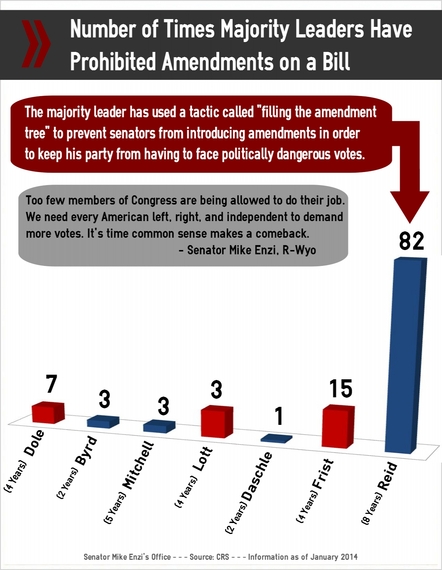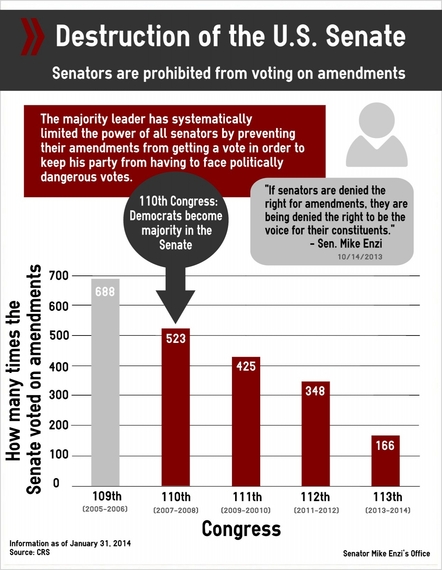A headline from a Capitol Hill newspaper declared that our current Congress could be the "worst ever." Another said negotiating political agreements is a "lost art." The whole country knows something is wrong with our government. It's time it's shown how to fix it, at least the U.S. Senate.
The problem is that senators are being prevented from doing their job. Common sense is ignored because bills are being made in a political vacuum. This results in more lengthy, complex, mono-political laws that defy logic. Every American, left, right and independent, should demand more votes and get behind simple, but effective good-government bills.
One bill could contain provisions affecting everything from health care to housing and increase the debt by hundreds of billions of dollars. I recently introduced a bill with Senator John Barrasso that would stop Congress from passing bills with unrelated measures attached. Senate Resolution 351 would require any legislation considered by the Senate to be limited to a single issue. One topic per bill helps you get things done. It means more understandable and manageable bills.
Now most bills are put together by one or two member offices. Committees that would scrutinize and improve legislation are skipped and most members of Congress and the public have no opportunity to weigh in. Nothing is approved unless the majority leader allows it. Dissenting opinions are rarely considered. The majority leader uses procedural tactics to prohibit amendments that could improve bills. He protects his party from taking politically difficult votes. He's done this more than any other majority leader. Political motivations and consolidation of power should not be used to deny senators from either party the right to represent the people in their states.
The majority leader blames filibusters, but there's really no opportunity to filibuster when debate is cut off before it begins. That's what the majority leader often does by a procedural maneuver known as filing cloture. In recent years he has often filed a cloture petition before any debate or amendments. Cloture is designed to bring debate to a close after a supermajority of the Senate is satisfied that a matter has received adequate consideration. That isn't happening, so I've joined Senator Grassley, R-Iowa, in cosponsoring his "End Cloture Abuse Resolution." It would amend the Senate rules to prohibit filing cloture until at least 24 hours of debate.
Also look at the number of amendments the current Senate majority has blocked from being considered. In 2005 and 2006 the Senate voted on almost 700 amendments on the Senate floor. Since the current majority took power the number has dwindled. In 2011 and 2012 it was about 350. So far in 2013 and 2014 it's less than 200. This majority leader uses a tactic called "filling the amendment tree" to prevent amendments. He used it 26 times during the last two years alone. By contrast the GOP used the tactic 15 times between 2003 and 2006. Filling the amendment tree prevents senators from exercising their right to offer an amendment because, once the tree is filled with pending amendments, no other senator can offer an amendment without 100 percent agreement from all other senators.
It's important for committees to have their opportunity to shape legislation. It is there that members are able to iron out the unintended consequences. Now, however, committees are ignored. Massive legislation results from a few people behind closed doors making deals. We need to get away from deal making and start legislating. This is apparent especially in our spending.
Under the Senate's current management, deals are made, then spending bills are all packaged into one massive, take-it-or-leave-it bill and the deficit is increased. In 2013, the Senate didn't pass a single appropriations bill individually. Only one was considered on the Senate floor by itself, and that bill did not pass in large part because the majority leader didn't like the first proposed amendment. Is it any wonder that in January 2009, the total federal debt stood at $10.6 trillion and now it's closer to $16.7 trillion? It's never risen so high so fast in our country's history.
We should look at each spending area individually. The committees, our small group problem solvers, should be able to look closely at each branch, each agency. Switching to a biennial appropriations process would help. I've introduced S. 625, the Biennial Appropriations Act and I'm also cosponsoring Senator Johnny Isakson's, R-Ga., version.
My biennial budgeting bill would require the president to submit a two-year budget resolution at the beginning of each Congress. Congress would then adopt a budget resolution. Following adoption of a budget resolution, Congress would focus on appropriations bills. Each year Congress would debate the Defense Appropriations bill. However, the other appropriations bills would be split into two groups. The more controversial bills would be debated in the first year of a session of Congress, the non-election year. The less controversial bills would be debated in the second year of a session of Congress, the election year. The bill would also require at least one joint oversight hearing with the appropriate authorizing committee and appropriations subcommittee. This would force Congress to identify spending priorities.
Limiting bills to one topic, ensuring a minimum of one-day's debate and a two-year budget are just a few changes that would improve how things work Washington.
Congress has 535 elected representatives. When they are looking at every proposal, lots of viewpoints and experience get put into the decisions made for our country, but if all the decisions are made by the majority leader, and a few confidants, the vast majority of Americans are ignored. Shortcuts are taken, committees are skipped. Legislation is long and not easily read or understood. Spending reaches all-time highs, but we get less for our money. This won't change unless those outside Washington demand it. Demand that these and other ideas get considered. Demand your senators be allowed to represent you.

